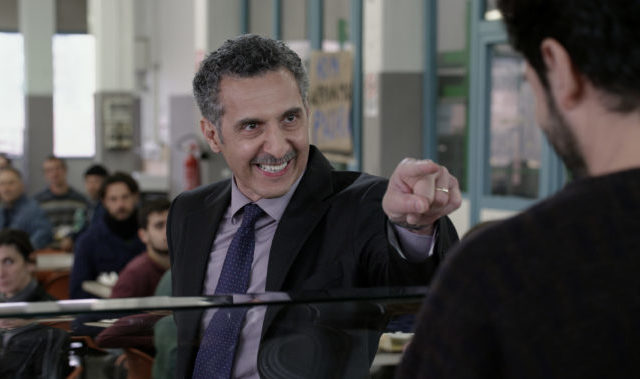Nanni Moretti’s highly acclaimed film “Mia madre” opens across the country today. To put it simply, this film is a piece of art and is not to be missed.
“Mia Madre” has been described as “a whirlwind of intimate and universally-shared emotions.” Moretti presents us with a story to which we can all relate. Based on his own experience, the film stars Margherita Buy whose character, also named Margherita, is a director shooting a film about a group of factory workers who risk losing their jobs. In the meantime, her mother (Giulia Lazzarini) is gravely ill, her teenage daughter Livia (Beatrice Mancini) is having trouble focusing on her studies and she is ending a relationship with a man (Enrico Iannello) who is still in love with her. She and her brother Giovanni, played by Nanni Moretti himself, are sharing the concerns and tasks in dealing with their dying mother. The illness takes a turn for the worse just as a pretentious American actor named Barry Huggins (John Turturro) who can’t remember his lines shows up and causes unnecessary drama. What follows is a deeply moving story of a family coming to terms with the death of their beloved matriarch. Through a series of angry outbursts, retakes, press conferences and dream sequences, we feel the emotional burden that Margherita carries as she tries to continue with her daily commitments while knowing her mother does not have much time to live, while Giovanni does the same in his own life, finally saying goodbye to a job can no longer stand.
Moretti’s mother passed away while he was making his 2011 film “Habemus Papam” (We Have a Pope). Therefore, he clearly lived this nightmare that we are all forced to experience in life. While the focus is on Margherita, the character development and performances are so outstanding, we also experience the profound pain from the perspective of the supporting characters.
There is a sense of fantasy to “Mia Madre.” At times, it’s not clear if what we are seeing is real or imaginary. For example, there is a press conference for the film, which is shown from the filmmakers’ point-of-view with overly complicated questions thrown at the them. Margherita gets lost in the complexity of the questions and locks glares with her ex-boyfriend for a moment of calm. But is he really there or is it a dream? There is another scene when Margherita realizes her mother is driving with an expired driver’s license. She rips the document into pieces, then proceeds to get into the car and repeatedly crash it into a building. Is this real or a dream? My interpretation is this element of fantasy represents the sick, surreal feeling we have when we know someone close to us, someone who has been with us for our entire existence is about to die. Just knowing that makes the simplest of tasks seem surreal.
In one scene while she is directing Barry, Margherita suddenly says, “Where will all the books go? All those hours of study..” It’s a literal and figurative thought because when a matriarch or patriarch passes away, there is the physical, monumental task of clearing out the house. This looming task, for some reason, stays on your mind. It’s always present and weighs heavy.
Moretti always keeps present the strong reminder of the circle of life and how life goes on for the next generation. We see this when Margherita and her ex-husband are teaching their daughter how to ride a scooter. It is one of the lighter moments of the film. He also shows us the strong, loving bond between grandmother and granddaughter; how she understood that her granddaughter’s troubles in school were caused by her unrequited affections for a boy. Then, there is the tender scene when the two are working together on Livia’s Latin studies.
Moretti also shows the frustration and the stress that comes with this situation and the strange nightmares we have when someone close to us is terminally ill and in their last days. In one intense and profoundly sad scene when her mother cannot take three steps to the bathroom, Margherita gets scared and cannot accept that her mother is so ill. She shouts, “It’s only three steps.” She then feels bad and starts to cry.
When the end is approaching, here in America, we are usually forced to make one of three tough choices.. continue with treatment, go home to die in your own bed or go to a comfort care facility. In the film, it was the brother and sister that were making all the medical choices and talking to the doctors. In the end, they chose to send their mother home, even though she wanted to stay in the hospital where she was comfortable with the nurses treating her illness.
The inevitable moment comes when our loved one takes their final breath. If we are lucky, we are at their bedside when it happens. If we experienced this as a child, we always remember that phone call or ring of the doorbell. Then, there’s the task of going through the closet looking for an eternal outfit, receiving visitors and listening to their stories and memories. In an interview with Cineuropa, Moretti said that his mother’s former students kept going back to her and talking to her about everything. It was something he found out only after her death through their stories.
Nanni Moretti did not leave one stone unturned. “Mia Madre” is a rare, timeless masterpiece with exceptional performances. Don’t miss your chance to see it on the big screen. Click here https://www.youtube.com/watch?v=jWiFif96t3Y to watch the trailer. Below are opening dates for cities across America.
September 2
San Francisco, CA
San Rafael, CA
Laguna Niguel, CA
Irvine, CA
San Jose, CA
Denver, CO
Chicago, IL
Ft Lauderdale, FL
Boca Raton, FL
Coral Gables, FL
Philadelphia, PA
Minneapolis, MN
Tucson, AZ
September 9
Santa Barbara, CA
Coral Gables, FL
Fronternac, MO
Atlanta, GA
Palm Desert, CA
Baltimore, MD
Austin, TX
Seattle, WA
Dallas, TX
San Diego, CA
Miami Beach, FL
Plano, TX
Portland, OR
September 16
Detroit, MI
Oklahoma City, OK
September 23
Charleston, SC
Scottsdale, AZ
Bloomington, IN
Santa Fe, NM
Ann Arbor, MI
Albuquerque, NM
September 30
Cleveland Heights, OH
October 7
Madison, WI
October 21
Houston, TX
 Fra Noi Embrace Your Inner Italian
Fra Noi Embrace Your Inner Italian







